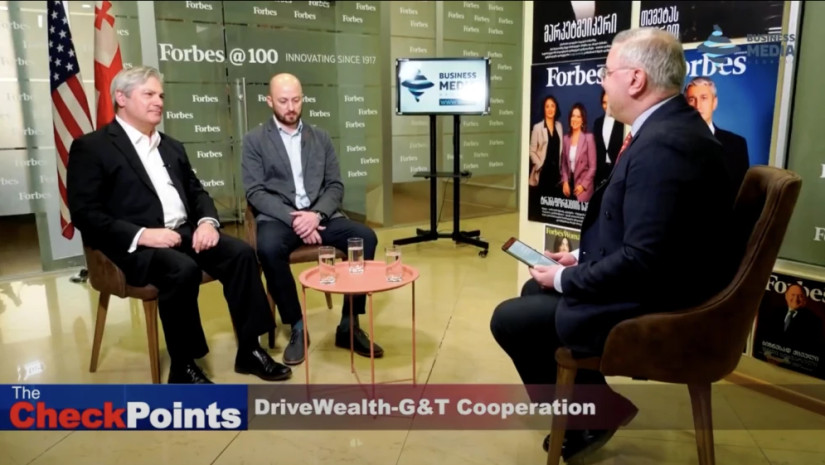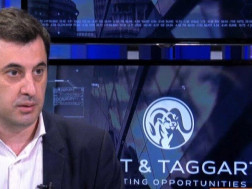DriveWealth, together with Galt and Taggart is on a mission to raise the financial culture in Georgia, making the business environment more appealing for investments. Find out more about their innovative product in an interview Giorgi Isakadze kindly conducted for The CheckPoints.
Giorgi Isakadze: Michael, so glad to have you in our office. Thank you so much for visiting us. DriveWealth in Georgia - this is very special. You're a member of 250 fintech companies on the US market. Georgia for DriveWealth - is it the 153rd country, am I right?
Michael Connor: We do have users in over 100 countries, so I think somewhat, yes. But I think that in terms of the partnership, the partnership with Bank of Georgia and Galt % Taggart is, I think about our hundredth, a little over one-hundredth partner.
Giorgi Isakadze: I also learned some details of your biography. I'm so impressed. I do have more questions about DriveWealth. What is DriveWealth? Let's brief our viewers and followers.
Michael Connor: DriveWealth is the pioneer in bringing fractional share trading to the world, and the idea really is to democratize investing so that investors of any size can own four Lari worth of Apple or 10 Lari worth of Facebook. We've been building that technology and that brokerage capability for about 10 years, and we partnered with great companies like Bank of Georgia, Galt & Taggart around the world, and this capability really opens up the world of investing for people who never had that kind of access before. We're talking about very large companies that are listed in the U.S. and very liquid market, very accessible market. So for regular retail investors, it's a very unique opportunity. We've been very successful with that. So we just had a very successful series the fundraising, which valued our company at 2.8 Billion dollars. We are now an official unicorn. It's great to be working here in Georgia.
Giorgi Isakadze: Yeah, but why Bank of Georgia and Galt & Taggart? What are the criteria for how you assess your future partners and allies?
Michael Connor: It's certainly important in each country where we do business that we want to work with very respected institutions. We also get involved with early-stage companies, but it's a wonderful thing when you can go into a country like Georgia and work with an institution like the Bank of Georgia that has so much presence and so much credibility. I was actually introduced to the Bank of Georgia by the founder of a European fintech, and that was really my first opportunity to look at the market and understand the potential here, and we were all very excited about it.
Giorgi Isakadze: David, tell me about your choice in regards to DriveWealth. Why DriveWealth? By whom you've been presented to Michael and company?
David Nishnianidze: You know that Galt & Taggart has a unique place in Georgia in terms of investments, and we are probably a leading brokerage house in Georgia. We've been listening to our clients very closely and trying to give them a product that they are requesting. One of them was more affordable trading capabilities. We had our homework, and then we start looking for providers, brokerage houses that could provide such services. Needless to say, we had many partners, potential partners on the list. However, the credibility experience went on DriveWealth's side. They do have a good track record. When we were evaluating the competition partners, one thing is to look at the track record, but the other one is still looking at the potential as well, right? We do have quite good potential with DriveWealth in terms of developments. We have to follow the client's needs. We do think that DriveWealth has a strong will to answer those needs down in the road. We can say, for now, the partnership has been really successful.
Giorgi Isakadze: You have a lot of consumers and clients and your portfolio is huge and impressive. What sort of consumers and clients is this partnership focused on? Who will benefit more in regards to your partnership with DriveWealth?
David Nishnianidze: Our slogan says "creating opportunities," right? The slogan of the Bank of Georgia says "Don't stop," right? So I think with this product, we've created opportunities and we're not stopping. And at the end of the day, the Georgian residents mainly and clients will benefit more from this product. We do think that this is going to be a basic need in terms of access and accessibility to the investments, and everybody should be entitled to access to the investments. If they have a little bit of savings and maybe thinking about growing their potential pensions or something like that down in the road for their big dreams, they should have access to participate in international markets and they should be able to invest it just like anybody else does in the world.
Giorgi Isakadze: I want to ask about the new investment platform, which has been launched and has been presented to local consumers. How is it doing? Do we have some sort of preliminary or basic statistics in terms of how it's growing?
David Nishnianidze: I think as a conclusion, we can say the interest is really high, but obviously it's a new product. It's new to us, new to the Georgian market and Georgian investors. And with that new product comes also some kind of like a learning curve. We have to also educate. I'm sure you've seen us kind of doing marketing campaigns, educational campaigns. We also have business courses. We also have done these talks just to kind of give that information from different channels so we can reach every single interested client. This is the benefit that ultimately the client's going to get. We are trying our best to get this message to everybody. We still know that there is a lot that needs to be done. But I think for now we're doing OK and the client interest is really high.
Giorgi Isakadze: How is Georgia doing in general from your perspective? You research Georgia while entering this market through these partnerships. How similar is Georgia's story of economic development to other countries where you are already presented? In general, what's your first impression?
Michael Connor: What we are seeing with this product is very typical of what we see in a new market, and I think David's absolutely right that there's an education process and a learning curve that has to be traveled. It's a quite revolutionary product. You know, two months ago, if you were a small investor in Georgia, you had no opportunity to invest in these products at all. And so in that sense, it's a very groundbreaking thing. And we've seen this in other countries where there's not a lot of opportunities to do those sorts of investments. So the other thing is, as we got to know David and his team, we could tell that they had done their homework. They knew the market they were going after. They knew how to present the product. They had great technology, which in some cases, large financial institutions have a problem with that. So in some respects, they combine the best of a large established institution with a very credible brand and lots of visibility with the technology chops of a startup company. My impression is that the country as a whole has done a really marvelous job of putting in place the structures to develop really attractive capital markets.
Giorgi Isakadze: You mean the legal base?
Michael Connor: Yes. I mean the regulatory structure, the interaction between financial institutions and the regulations, there seems to be very good communication there, the openness to new products. Sometimes you go into a country and that's not the stance of the regulators. So my impression and again from an outsider's perspective is that things we see in other well-developed capital markets are all in place here. So I think you should be optimistic about that.
Giorgi Isakadze: Thanks so much for that, David, what are your thoughts?
David Nishnianidze: We need to work harder. It's all about awareness, right? And it's all about the understanding economics behind the capital markets. If someone wants to get more funded or to acquire more kind of like interest and funds for growth, capital market should be one of the places to consider. Georgia has to do a lot of work from every perspective. But again, one thing that will help is understanding. I think this new product, what it will do is that it's going to create this kind of understanding of the investment right from the demand side because a capital market kind of has both sides right supply and demand. So I think with this product, we're going to be able to create the demand. And once the demand is out there, then the supply side also will follow. But, you know, we have to work on both ends to kind of supplement that.
Giorgi Isakadze: You mentioned 'the unique possibility for diversified investment.' Can you elaborate more about this unique opportunity? What do you mean by diversified investment?
David Nishnianidze: I think we have offered a unique opportunity for Georgian residents to be able to access investments. About the diversification - that's one of the key things that people have to consider, right? With this product, we have access to U.S. markets, and the US market is undoubtedly the most liquid market in the world. They have access to stocks, ETFs. In terms of portfolio creation, someone has to have a little bit of cash balance on their banking accounts, as well as maybe a little bit retail in real estate, I should say, and also a portion of their investment be in stocks and obviously bonds and different of products that are considered as an investment. But with this platform, we do have an opportunity to diversify the holdings and pick and choose specific stocks, specific sectors, ETFs. Just investing in SPY, which is the index for S&P 500, and we S&P 500 tracks 500 listed companies in the U.S., that's itself is a diversification - when you are following those 500 companies, with just buying one instrument. This is also part of education. Coming from the riskiness of the investments and kind of like risk appetite is subjective and it's individual. If someone is risk-averse, they can just move towards ETFs or if someone is riskier, they can pick and choose stocks and go with the stock investments. But again, everything depends on the point of view of investors and their plans. Investing is a long-term version of saving and building wealth. If someone thinks that they're going to need money in a month or two, I think it's better to stay on the sidelines, decide what they want to do with their money first and then go with the investments.
Giorgi Isakadze: Michael, I cannot miss the opportunity to ask you, how has the pandemic changed things? How has the behavior of investors changed? Did they change at all or not?
Michael Connor: DriveWealth has been in a really unique position to watch and learn from what has happened during the pandemic era. One thing that happened is that there has been a huge explosion in retail investors around the world, and this is one of the advantages of our business model that we have partners around the world. So we see that with the onset of the pandemic, for various reasons, people got much more serious about their own financial well-being. For a lot of people, getting involved in active investing was an important part of that and continues to be. We see much higher levels of participation in overall market activity from the retail segment. The other thing is, I mean, there's no doubt for new investors, there's an emotional component to it. There are new tools that people can use to be smart about their investments, even if there's an emotional element to it. So we've seen this with certain stocks that have been popular on various sites and social media platforms, right? I think that will continue to be the case, that people will get their information in new and unique ways, and it makes them informed investors, but also they invest in the things that they're interested in. Hopefully, with this education process, you focus on. diversification first and this idea of dollar-cost averaging that is making small investments regularly over time, and those are really the winning formulas for retail investors.























